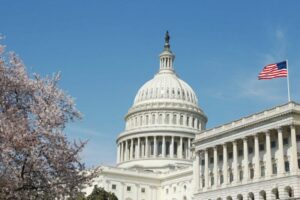Federal Advocacy Outlook 2025: Early Days
Federal Expectations: White House to Dictate, Congress Likely to Follow
 Following the Republican trifecta gain of the White House and both houses of the U.S. Congress, business leaders would be wise to spend early 2025 assessing how politics will drive policy.
Following the Republican trifecta gain of the White House and both houses of the U.S. Congress, business leaders would be wise to spend early 2025 assessing how politics will drive policy.
At this early stage, it’s still unclear what and how policy issues will play out in the near term. However, most political watchers expect that lower corporate taxes, overall deregulation (specifically, decreased scrutiny from the Federal Trade Commission, especially regarding mergers and acquisitions) and a potential rollback of the drug pricing provisions in the Inflation Reduction Act (IRA) will aid industry growth.
On the other hand, potential tariffs as high as 60% on goods imported from China, 25% on those from Mexico and Canada, as well as 10%–20% on goods imported from other geographies, may wreak havoc on supply chains, manufacturing operations and bottom lines.
Note that even if the IRA is partially rolled back, drug pricing reform is still in play. Several pricing mechanisms were proposed in President Trump’s first term that could still materialize in 2025. And there’s still plenty of interest in Congress on curtailing pharmacy benefit managers (PBMs) as a way to control patient out-of-pocket drug costs.
The uncertainty surrounding the possible confirmation of Robert Kennedy Jr. as Secretary of the Department of Health & Human Services and what that might mean for the FDA, NIH and CDC. Some believe that Kennedy will bring positive change to a bureaucracy that needs some overhauling. Part of that belief is predicated on the fact that nominees for FDA, Martin Makary, MD, and Mehmet Oz, MD, have not faced significant criticism as they don’t share similar views with Kennedy and have a good grasp of the agencies they are likely to lead. All this points to product approvals that might be changed but not slowed.
With the Trump administration following through with its proposed immigration policy overhaul, as exemplified by an executive order to shut down the H1B visa program, companies may find taking on highly technically skilled immigrant workers across the pharma and medtech sectors more challenging.
Lastly, it seems like tax policy will be front and center for the new Administration, especially with a focus on levying tariffs. Attempts will be made to reduce corporate taxes overall and make U.S. businesses more competitive internationally and encourage economic growth. For companies that manufacture products within the U.S., Trump has suggested lowering the tax rate even further. This policy is intended to incentivize domestic production and potentially bring manufacturing jobs back to the U.S.
However, the top tax policy priority for the biosciences industry remains- the need to restore the ability to immediately deduct R&D expenses in the year in which they were incurred. An important implication for companies is that the current policy incentivizes investment abroad rather than domestically, bolstering the R&D of foreign corporations rather than our own. Even for R&D that stays here in the U.S., the current requirement that patent costs also be capitalized incentivizes U.S. companies to limit patent filings even further and instead keep their technology a trade secret. In turn, this stifles innovation and commercialization and wreaks havoc on bottom lines, especially for early-stage companies who cannot afford to lose pennies.
MichBio, along with its national partners, the Biotechnology Innovation Organization (BIO), Advanced Medical Technology Association (AdvaMed) and Medical Device Manufacturers Association (MDMA), will be carefully monitoring the federal policy landscape as it evolves in early 2025. As part of that vigilance, MichBio plans to attend the annual AdvaMed State Medtech Alliance Capitol Hill Fly-In on February 25-26, and the BIO Council of State Bioscience Associations (CSBA) Legislative Fly-In on April 1-2. MichBio plans to host a Breakfast Reception for the Michigan Congressional delegation during the BIO Capitol Hill visit. Our members are invited to participate in both DC visits – but space is limited – so contact us ASAP at stephen@michbio.org with your interest.
